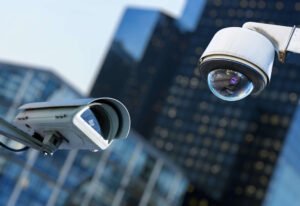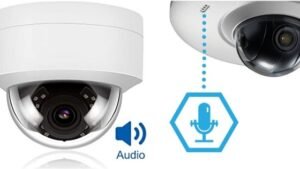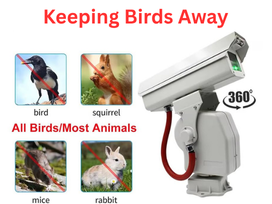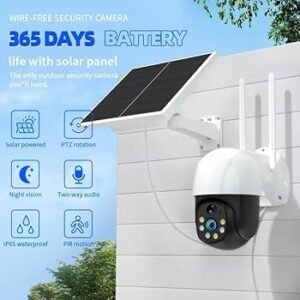Why you should use Outdoor Security Cameras?
Outdoor security cameras remain one of the most effective and reliable ways to protect homes and businesses. Whether you’re using traditional camera systems or the latest AI-powered technology, outdoor surveillance provides invaluable security benefits and peace of mind.
⭐ Key Advantages of Outdoor Security Cameras
| Security Benefit | Description |
|---|---|
| Perimeter Monitoring | Watch entrances, driveways, fences, parking lots & more |
| Crime Deterrence | Visible cameras reduce break-ins and trespassing |
| Proof & Evidence | High-resolution video supports legal and insurance claims |
| Policy & Safety Compliance | Monitor employee safety & workplace procedures |
| Track Activity & Labor | Verify deliveries, contractors, and site activity |
| Early Problem Detection | Identify risks before they escalate |
| Insurance Benefits | Many insurers offer discounts for video security |
🎤 Do Outdoor Security Cameras Have Audio?
Many outdoor cameras support audio, but not all models include built-in microphones.
✅ Options for Audio
-
Cameras with built-in mics (doorbell & access control cameras often do)
-
Add-on outdoor microphones
-
Two-way audio models for communication or warning announcements
🕒 How Long Do Outdoor Cameras Store Footage?
Footage retention depends on:
-
Number of cameras
-
Storage device (NVR/DVR/Cloud)
-
Resolution
-
Frame rate
-
Encoding format (H.265+)
-
Activity level on site
Storage Methods
| System | Storage Method |
|---|---|
| Analog Cameras | DVR |
| IP Cameras | NVR + optional SD card & cloud backup |
| Wireless Cameras | Local SD card + cloud (brand dependent) |
🌡️ Outdoor Camera Lifespan & Durability
Outdoor cameras can last 10+ years with proper installation & care.
Factors affecting lifespan
-
Weather (rain, snow, heat, dust, wind)
-
Sun exposure
-
Salt-air environments (coastal)
-
Enclosures & mounting hardware
Specialty cameras are available for:
-
Extreme heat
-
Freezing climates (Arctic-rated models)
-
Marine & coastal environments
🎥 Recording Modes
| Mode | Description |
|---|---|
| Continuous recording (CVR) | Full-time recording |
| Motion-activated | Saves storage, ideal for low-traffic areas |
| Event-triggered | Records only on alerts or alarms |
| Cloud recording | Remote storage backup |
⚖️ Are Outdoor Security Cameras Legal?
Yes — in most cases — but rules vary. Key points:
-
Check state and local laws
-
Audio recording rules differ (one-party vs two-party consent states)
-
Avoid aiming cameras at areas where someone expects privacy
-
Always record ethically
Secure IT Global can guide you on compliance.
🔋 Do Outdoor Cameras Require Power?
Camera Power Types
| Type | Power |
|---|---|
| Wired IP (PoE) | Ethernet cable (recommended) |
| Wired Analog | Coax + power |
| Wireless Cameras | Battery or outlet + WiFi |
📡 Do Outdoor Cameras Need Wi-Fi?
Not always.
-
PoE or coax systems do NOT need Wi-Fi
-
Wi-Fi needed only for cloud access and remote viewing
Direct wired networks are more secure, faster, and stable.
🌐 Internet Speed Requirements
Minimum upload 5 Mbps for remote access, but varies based on:
-
Camera quantity
-
Resolution (1080p, 4MP, 8MP/4K)
-
Compression (H.265+)
⚠️ Common Limitations & Considerations
Wireless cameras:
-
Use bandwidth / may slow Wi-Fi
-
Vulnerable to hacking if unsecured
-
Can lose connection
Wired cameras:
-
More installation labor
-
Best long-term reliability & security
🛠️ Hiding Camera Wires (Best Practices)
-
Run cabling through walls
-
Use weatherproof conduit covers
-
Paint routing areas
-
Use soffit & trim spaces
-
Add protective metal housing for commercial installs
Secure IT Global provides professional installation support.
🐦 Keeping Birds Away
Safe deterrents include:
-
Reflective tape
-
Decoy owls
-
Fishing line
-
Chili pepper mix
-
Baking soda
Avoid harmful methods — we protect property and safety.
🔥 Weather Impact
| Condition | Solution |
|---|---|
| Heat | Cameras with cooling or shaded housing |
| Cold | Arctic-rated models with heaters |
| Rain | IP66/IP67 weather-rated cameras |
Outdoor security cameras are an essential investment for modern safety and peace of mind. Whether protecting your home, business, parking area, or warehouse, smart outdoor surveillance delivers proactive protection, real-time monitoring, and reliable evidence when needed most.
📞 Contact Us
Secure IT Global LLC
167 Madison Ave
New York, NY 10016
(888) 902 2303











